Antidepressant Sleep Match Tool
Find Your Sleep-Friendly Antidepressant
Why This Matters
Antidepressants affect sleep differently—some worsen insomnia, others improve it. This tool helps you match your sleep needs to the right medication based on clinical data.
Personalized Recommendations
Why Your Antidepressant Might Be Keeping You Awake
It’s not just in your head. If you started an antidepressant and suddenly can’t fall asleep-or you’re sleeping too much-it’s likely the medication itself. Around 70% of people with depression also struggle with sleep problems, and many antidepressants make those issues worse before they get better. The truth is, almost every antidepressant changes how your brain regulates sleep. Some help you fall asleep faster. Others turn your nights into a battle with racing thoughts and restlessness. Knowing which ones do what-and how to adjust-can make all the difference.
How Antidepressants Actually Change Your Sleep
Antidepressants work by tweaking brain chemicals like serotonin, norepinephrine, and dopamine. These same chemicals control your sleep-wake cycle. When you start taking them, your brain doesn’t adjust right away. The result? Your sleep architecture gets scrambled. REM sleep-the stage where you dream-gets suppressed. Sleep onset latency (how long it takes to fall asleep) increases. And deep sleep might shrink or expand depending on the drug.
SSRIs like fluoxetine and sertraline are the most common culprits for insomnia. Studies show they reduce REM sleep by up to 29% in the first week and push back when REM starts by 50 to 80 minutes. That’s why so many people report lying awake at 2 a.m. after starting these meds. On the flip side, drugs like mirtazapine and trazodone do the opposite: they boost slow-wave sleep and cut down on nighttime awakenings. One 2020 trial found mirtazapine added nearly an hour of sleep per night.
Which Antidepressants Cause Insomnia? The Real Numbers
Not all antidepressants are equal when it comes to sleep. Here’s what the data says:
- Fluoxetine (Prozac): 78% of users report insomnia in the first two weeks-the highest rate of any SSRI.
- Sertraline (Zoloft): 65% experience sleep disruption, but less than fluoxetine.
- Paroxetine (Paxil): Less insomnia than other SSRIs, but more drowsiness.
- Mirtazapine (Remeron): 81% of users say it helps them fall asleep, but 63% feel too groggy during the day at doses above 30 mg.
- Trazodone: Used off-label for sleep, it cuts nighttime wakefulness by 37%, but many report a "hangover" feeling the next morning.
- Agomelatine: Only 8% reduction in REM sleep (compared to 22% for SSRIs), making it one of the most sleep-friendly options.
- Bupropion (Wellbutrin): Not an SSRI, but it’s activating. When mixed with SSRIs, insomnia risk jumps 2.4 times, according to FDA data.
Even the dose matters. For venlafaxine, insomnia peaks at 150 mg and drops off at higher doses. With fluoxetine, somnolence risk rises from 1.2% at 20 mg to 4.7% at 60 mg. There’s no one-size-fits-all formula.
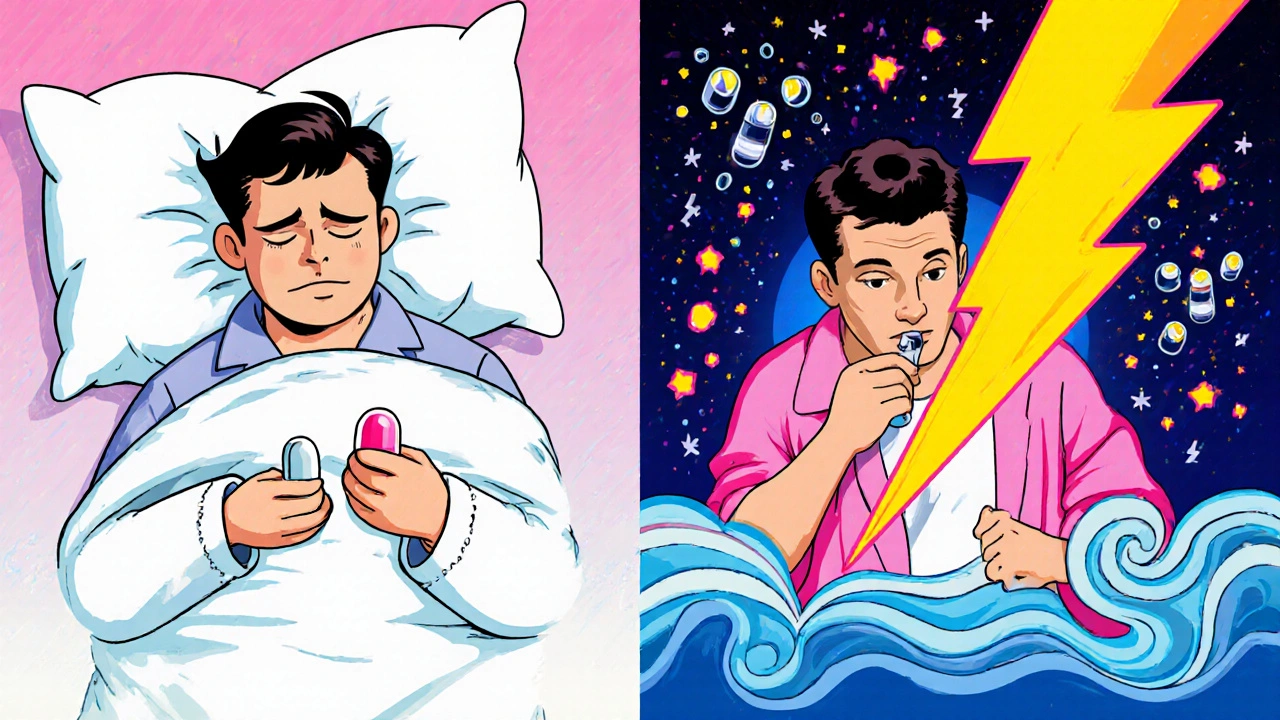
Timing Is Everything: When to Take Your Meds
When you take your antidepressant can be just as important as which one you take. Taking an SSRI in the evening? You’re setting yourself up for trouble. Studies show taking SSRIs before 9 a.m. reduces insomnia risk by 41%. Why? Because these drugs stimulate brain activity, and that stimulation lingers for hours.
For sedating antidepressants like mirtazapine or trazodone, timing matters too. Take them 2 to 3 hours before bed-not right before. That gives your body time to process the drug without causing next-day grogginess. A 2021 trial found patients who took trazodone at 8 p.m. slept better than those who took it at 10 p.m., even though both groups got the same dose.
If you’re on a mix of meds-say, an SSRI in the morning and trazodone at night-stick to that schedule religiously. Skipping or switching times can throw your sleep cycle off for days.
What to Do If Your Sleep Gets Worse
Insomnia from antidepressants usually peaks between days 3 and 7. For most people, it improves on its own within 3 to 4 weeks. But waiting it out isn’t always the best plan. Here’s what actually helps:
- Start low, go slow. If you’re on an SSRI, ask your doctor about starting at half the usual dose. A 2022 Harvard protocol showed starting venlafaxine at 37.5 mg instead of 75 mg cut insomnia risk by 32%.
- Try splitting your dose. Some people find relief by taking half their SSRI in the morning and half in the early afternoon. This isn’t officially approved yet, but a University of Michigan trial launched in March 2024 is testing this exact approach.
- Switch to a sleep-friendly option. If you have insomnia-predominant depression, mirtazapine (7.5-15 mg) or trazodone (25-50 mg) at bedtime are top choices. A 2021 meta-analysis found mirtazapine had an effect size of 0.8 for sleep improvement-three times better than SSRIs.
- Track your sleep. Use a simple sleep diary for two weeks. Note when you go to bed, how long it takes to fall asleep, how many times you wake up, and how rested you feel. This gives your doctor real data-not just "I feel tired."
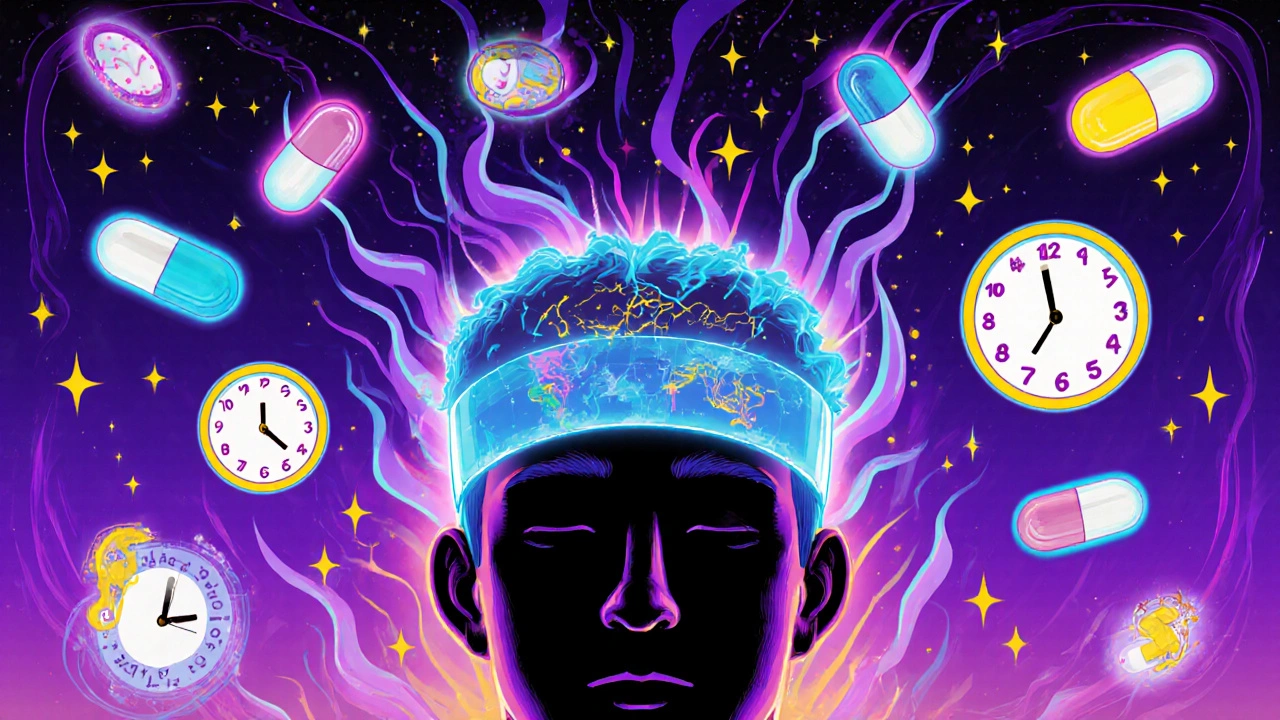
Red Flags: When Sleep Changes Mean Something Serious
Most sleep issues from antidepressants are temporary. But some signals mean you need to act fast:
- Acting out dreams. If you’re punching, yelling, or kicking while asleep, you might have REM sleep behavior disorder (RBD). SSRIs trigger this in 68% of users compared to 22% of non-users, according to the Cleveland Clinic.
- Restless legs syndrome. Mirtazapine can make this worse. If your legs feel like they’re crawling at night, talk to your doctor.
- Worsening depression with poor sleep. If your mood dips and sleep doesn’t improve after 4 weeks, your current med might not be right for you.
If any of these happen, don’t wait. Ask for a sleep study (polysomnography). It’s the only way to confirm if your brain’s sleep patterns are truly off-track.
What’s New in 2025: Personalized Sleep Matching
The future of antidepressants isn’t just about treating depression-it’s about matching the drug to your sleep profile. In 2025, Genomind launched a $349 genetic test that looks at 17 genes linked to sleep regulation and predicts how you’ll respond to 24 different antidepressants. Are you a slow metabolizer? You might need lower doses. Do you have a variant that makes you sensitive to serotonin? SSRIs could wreck your sleep.
Meanwhile, the National Institute of Mental Health is funding $14.3 million in research to test timed dosing based on your circadian rhythm. Imagine taking your SSRI at 7 a.m. if you’re a night owl-or at 10 a.m. if you’re an early riser. That’s the direction we’re headed.
And then there’s zuranolone (Zurzuvae), the first antidepressant approved in 2023 specifically for rapid sleep improvement. In clinical trials, it cut insomnia symptoms by 54% in just two weeks. It’s not for everyone-but it’s proof that sleep is now a core target in depression treatment.
Bottom Line: Your Sleep Matters
Depression and sleep are locked in a cycle. Poor sleep makes depression worse. Depression makes sleep worse. Antidepressants can break that cycle-or make it worse. The key is choosing the right drug for your sleep pattern, not just your mood. If you have trouble falling asleep, skip the SSRIs at first. Try mirtazapine or trazodone. If you’re sleeping too much, an activating drug like bupropion might help. Timing, dose, and patience all matter. And if things don’t improve after four weeks? Talk to your doctor. You don’t have to suffer through sleepless nights just because you’re taking medication to feel better.
Do all antidepressants cause insomnia?
No. While SSRIs like fluoxetine and sertraline commonly cause insomnia-especially in the first few weeks-other antidepressants like mirtazapine, trazodone, and agomelatine are actually used to improve sleep. The effect depends on the drug’s chemical profile. Some increase alertness; others promote drowsiness. It’s not a side effect-it’s a targeted action.
How long does antidepressant-induced insomnia last?
For most people, insomnia from SSRIs peaks between days 3 and 7 and improves naturally within 21 to 28 days. This is because the brain gradually adapts to the new chemical balance. If sleep hasn’t improved after 4 weeks, the medication may not be the right fit for your sleep profile. Don’t wait longer than that without talking to your doctor.
Can I take melatonin with my antidepressant?
Yes, melatonin is generally safe to take with most antidepressants and may help reset your sleep-wake cycle. It’s especially useful if your insomnia is tied to delayed sleep phase (falling asleep very late). But don’t self-prescribe high doses. Start with 0.5-1 mg, taken 1 hour before bed. Talk to your doctor first, especially if you’re on medications that affect liver enzymes.
Why does mirtazapine make me so sleepy during the day?
Mirtazapine blocks histamine receptors, which causes sedation. At doses above 30 mg, this effect becomes stronger and often lasts into the next day. The solution? Lower the dose to 7.5-15 mg. Many patients find this dose still helps them sleep at night but doesn’t leave them foggy in the morning. If daytime sleepiness persists, talk to your doctor about switching to trazodone or agomelatine.
Is it safe to stop my antidepressant if my sleep is terrible?
No. Stopping abruptly can cause withdrawal symptoms, including rebound insomnia, anxiety, and even worsening depression. Instead, talk to your doctor. They can help you lower the dose gradually, switch to a more sleep-friendly medication, or add a short-term sleep aid. Your mental health and sleep are both important-don’t sacrifice one for the other.
Should I get a sleep study if I’m on antidepressants?
Only if you have red flags: acting out dreams, leg movements at night, or persistent insomnia after 4 weeks. Polysomnography can detect REM sleep behavior disorder or restless legs syndrome-both of which are worsened by SSRIs. For most people, a sleep diary and doctor consultation are enough. But if your symptoms are unusual or severe, a sleep study gives you real data to guide treatment.
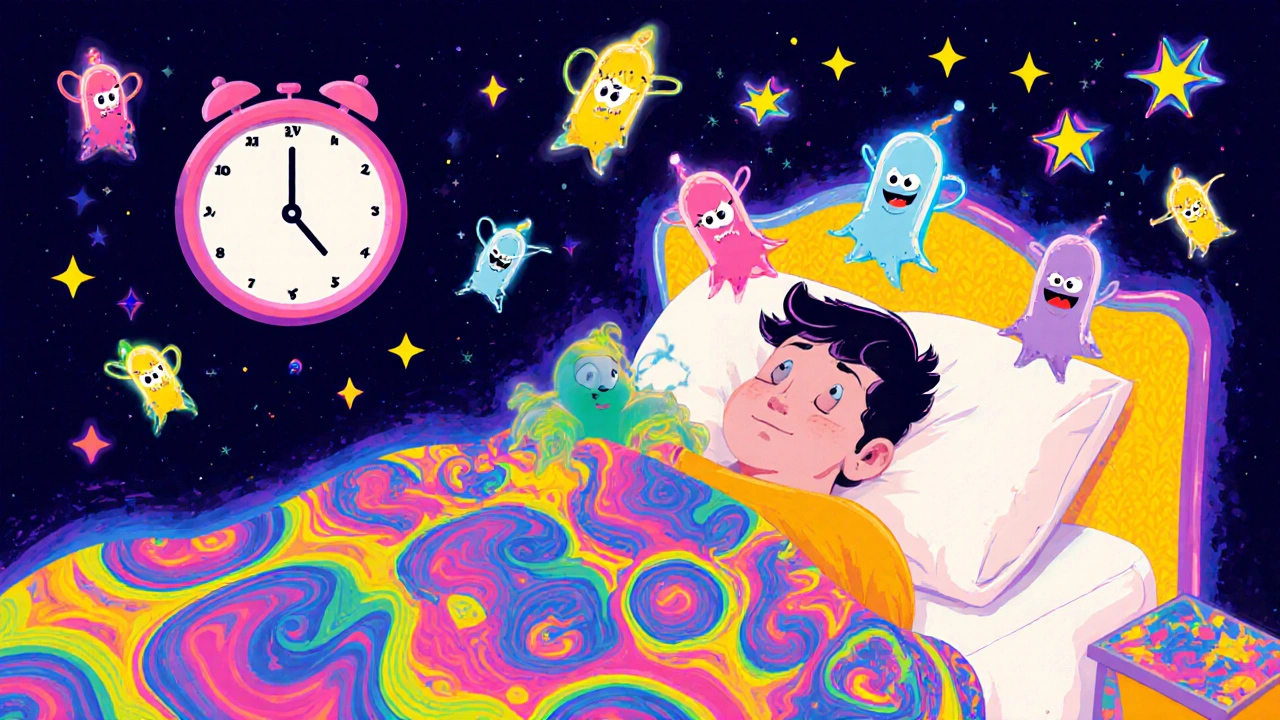
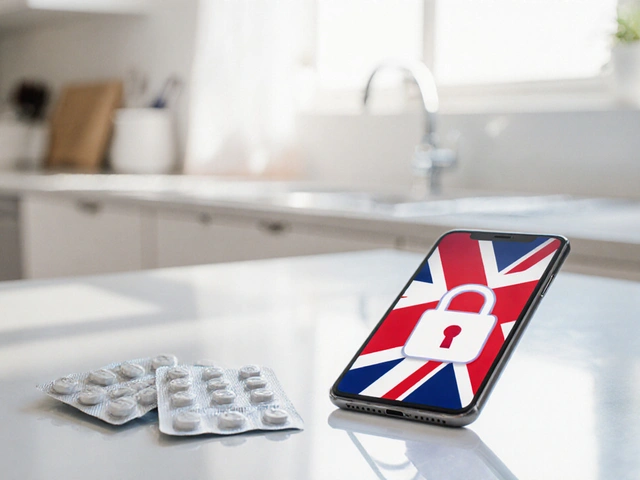
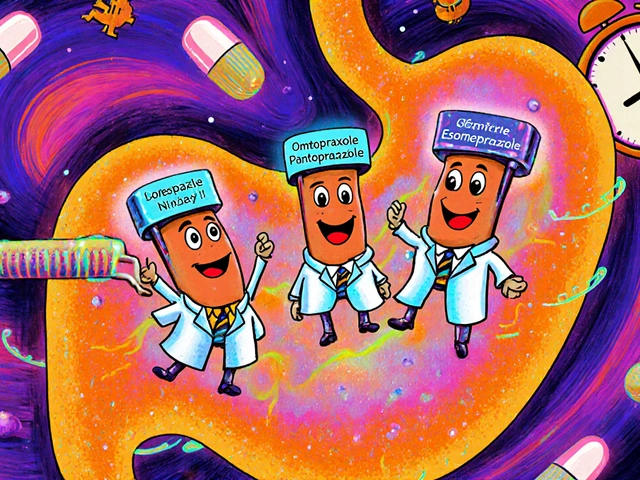
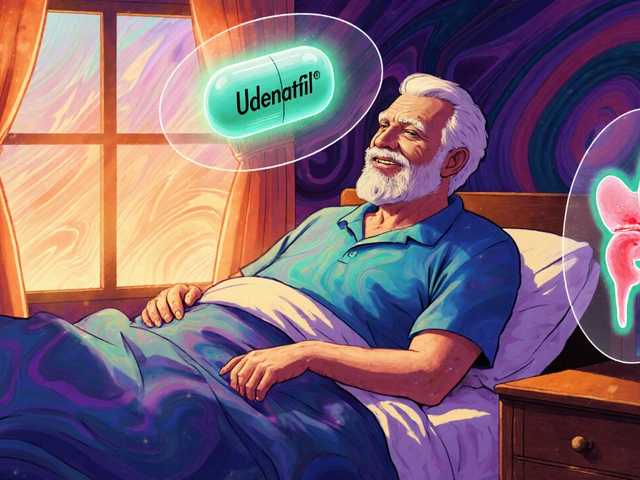
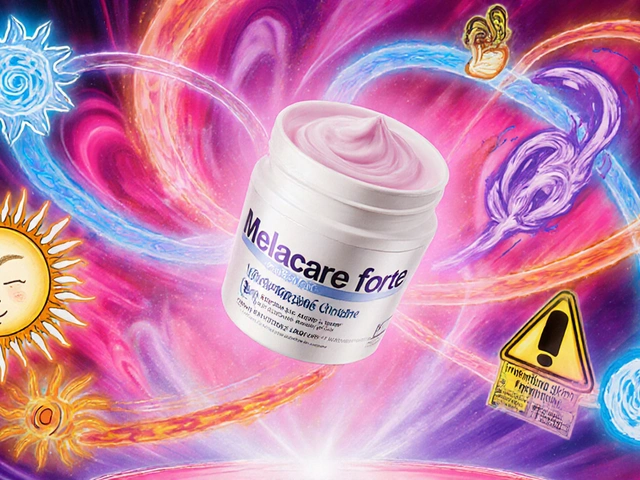
Amie Wilde
November 11, 2025 AT 22:29Started sertraline last month. Slept like a rock for 3 days, then BAM-2 a.m. scrolling through cat videos forever. Didn’t think it was the med until I read this. Thanks.
Gary Hattis
November 12, 2025 AT 18:33As someone who moved from India to the US and tried every SSRI under the sun, let me tell you-timing is everything. Took fluoxetine at 8 p.m.? Nightmare. Switched to 7 a.m.? Slept like a baby. Also, mirtazapine at night saved my life. No more 4 a.m. panic spirals.
vanessa k
November 12, 2025 AT 18:45I’ve been on trazodone for 6 months and I still feel like a zombie at 11 a.m. I lowered the dose to 25mg and it’s better but not perfect. Why is there no happy medium?
manish kumar
November 14, 2025 AT 17:08Let me tell you something, folks. In India, we don’t have access to all these fancy meds like zuranolone or Genomind tests. Most of us are on whatever the doctor gives us, and we suffer silently. I’ve been on fluoxetine for 11 months and my sleep is still trash. But I keep going because I know it’s not just about sleep-it’s about surviving. Please don’t judge people who can’t switch meds easily. We need better access, not just better science.
Nicole M
November 15, 2025 AT 06:45Has anyone tried combining melatonin with bupropion? I’m on 150mg and it’s keeping me awake, but I’m terrified to add anything else. My doctor just says ‘try sleep hygiene’ like that’s a magic fix.
Arpita Shukla
November 15, 2025 AT 21:38Actually, you’re all missing the point. The real issue is that SSRIs mess with serotonin receptors in the brainstem, not just the cortex. That’s why REM suppression happens. And no, melatonin doesn’t fix that-it just masks it. If you’re serious about sleep, you need to understand neuropharmacology, not just swap meds.
Benjamin Stöffler
November 17, 2025 AT 01:28But… but… what if the insomnia isn’t the drug? What if it’s the existential dread of being alive in 2025? The algorithm? The climate collapse? The fact that your antidepressant is literally just a chemical Band-Aid on a societal wound? I’m not saying the science is wrong-I’m saying we’re treating symptoms while the whole damn house is on fire.
Mark Rutkowski
November 17, 2025 AT 06:11There’s a quiet beauty in sleeplessness, y’know? When the world is quiet and your thoughts are loud, you start to hear yourself. Not the version you show on Instagram. Not the version your therapist wants to fix. Just you. The meds? They’re just trying to mute the noise. But sometimes… the noise is the only thing keeping you real.
Ryan Everhart
November 17, 2025 AT 13:22So… you’re telling me the solution to depression is… taking more pills? Brilliant. I’m sure the pharmaceutical companies are thrilled. Meanwhile, I’m over here trying to remember if I ate breakfast. Thanks for the science, guys.
David Barry
November 19, 2025 AT 08:2178% insomnia with fluoxetine? That’s not a side effect-that’s a warning label. Why is this still first-line? Because it’s cheap. Because it’s patentable. Because Big Pharma doesn’t care if you sleep-they care if you buy. This isn’t medicine. It’s a gamble.
Alyssa Lopez
November 21, 2025 AT 04:23As an American, I find it offensive that people think sleep studies are optional. We have the best healthcare in the world. If you’re on antidepressants and can’t sleep, you’re not trying hard enough. Get a sleep tracker. Buy a white noise machine. Stop whining.
Alex Ramos
November 23, 2025 AT 03:50Just wanted to say-mirtazapine 15mg at 8pm changed my life. No more daytime fog. No more 3 a.m. panic. I was skeptical, but it worked. Also, use a sleep app. Mine told me I was getting 5.5 hours of deep sleep after switching. I cried. Seriously.
edgar popa
November 25, 2025 AT 00:45took my sertraline at night by accident once… woke up at 4am like a caffeinated raccoon. never again.
Eve Miller
November 25, 2025 AT 19:45It’s irresponsible to suggest melatonin as a solution without mentioning its potential interactions with CYP450 enzymes. Many patients on SSRIs metabolize drugs slowly. Unsupervised supplementation is dangerous. You should consult a pharmacist before taking anything.
Chrisna Bronkhorst
November 26, 2025 AT 17:19Why are we still treating sleep as a side effect? It’s the core symptom. We’re treating depression like it’s a broken lightbulb. But what if the whole electrical grid is failing? We need systemic change-not just better pills.